Do you have Hashimoto’s and feel like it’s impossible to lose weight?
You’re not alone:
Many patients with Hashimoto’s struggle with the same problem! In fact, it’s one of the biggest complaints among thyroid patients with this autoimmune disease.
The truth is that even though losing weight with Hashimoto’s can be incredibly difficult, it’s far from impossible.
You just need to have the right information so that you can start taking action today.
Today, we are going to be discussing this very topic.
I’m going to teach you how to lose weight if you have Hashimoto’s and provide you with actionable advice and information that has been used by hundreds, if not thousands, of thyroid patients.
No tricks, no gimmicks, just helpful information designed to get you the results you are looking for.
Step #1. Start By Checking Your Metabolism
Having a normal metabolism is absolutely critical for weight loss.
Unfortunately for Hashimoto’s patients, the thyroid is one of the major hormones involved in setting and regulating your metabolism.
If there is a problem with your thyroid hormone levels then there will be a problem with your metabolism.
Low thyroid hormone = low metabolism.
How do you check your resting metabolic rate?
There is actually a very simple and cost-effective way to get a decent idea of what your resting metabolic rate is…
That’s by checking your basal body temperature FIRST thing in the morning.
Here’s how you do it:
Put a thermometer and a piece of pen and paper by your bed while you’re sleeping. As SOON as you wake up, check your body temperature (either by mouth or using your underarms) and write down your body temperature each morning.
Repeat this process for at least 7 days (you will need to do it more if you are an ovulating woman).
If your metabolism is contributing to your weight loss resistance then your numbers may look something like this…
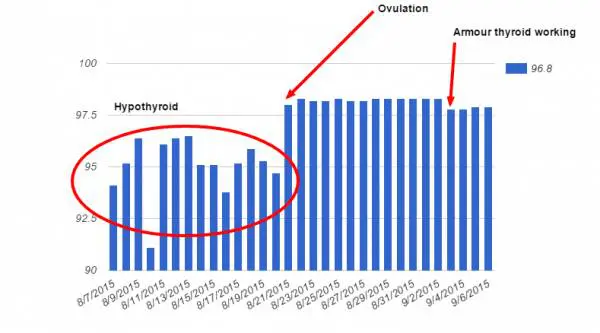
This is a set of basal body temperatures from one of my patients who took her body temperature every day over the course of a month.
The graph easily depicts the chaotic nature of body temperatures that are common when your body doesn’t have enough tissue levels of thyroid hormone.
In her case, you can clearly see the numbers not only increase but become less chaotic during ovulation and after her menstrual cycle after 1 month of treatment with Armour Thyroid.
What else causes chaotic basal body temperatures?
Like many tests in medicine checking your basal body temperature is not a perfect test.
Body temperatures can be off for a number of reasons, but it is a very cheap and cost-effective way of estimating your basal metabolic rate.
There are other conditions that alter your body temperature:
- Adrenal fatigue/problems – Adrenal issues are common in Hashimoto patients and can also result in decreased basal body temperature. If you feel your thyroid dose is optimized then look to your adrenals.
- Ovulation (in a woman) – The ovulatory process causes about a 1-degree increase in body temperature which stays elevated for about 10 days. Checking your basal body temperature is a great way to help determine if you are having anovulatory cycles (which many women with Hashimoto’s experience).

What can you do to treat a slow metabolism?
Most of the time in Hashimoto’s patients (or any patient with Hypothyroidism) a slow metabolism is due to undertreatment of thyroid hormone or using the wrong type of thyroid hormone medication (we will elaborate on how to get on the right dosing and type of medication below).
While proper medication may be the most important factor there are still a number of recommendations you can start implementing today to improve your metabolism…
Consider the following tips:
- Check and treat your adrenal function – Advanced cortisol tests such as salivary cortisol are not always necessary.
- Avoid calorie-restricted diets!
- Make sure you are on the right type and dosing of thyroid hormone – Elaboration below.
- Reduce and avoid (if possible) medications that slow metabolism – I realize this may not be possible for everyone but many medications can slow metabolism: anti-depressants, narcotics, anti-seizure medications, blood pressure medications, steroids, and diabetic medications that cause an increase in insulin levels.
- Get 7-8.5 hours of quality sleep every night.
- Incorporate weight training into your exercise routine to build muscle mass.
Step #2. Get on the Right Type and Dose of Thyroid Hormone Replacement
A huge problem with patients that I see in my practice is that they aren’t on optimal medication or dosing of medication.
This happens frequently because many Doctors will treat only your lab numbers instead of a combination of your symptoms and lab values…
The truth is that your pituitary gland (the organ that secretes TSH) is exquisitely sensitive to thyroid hormones (T4 and T3) because it has different deiodinases than every other cell in the body.

What that means is that your pituitary will be getting enough thyroid hormone (thus lowering your TSH) while many other cells in your body are still starving for thyroid hormone – resulting in symptoms despite a normal TSH.
This results in doctors assuming every cell in your body has enough thyroid hormone when instead really only the pituitary does.
Getting on the Right Type of Thyroid Medication
We need to talk about some basics:
There are two forms of thyroid hormone floating around in your body…
T4 or thyroxine – This is the carrier form of thyroid hormone.
T3 or triiodothyronine – This is the active form of thyroid hormone and the majority in your body comes from T4 conversion to T3 via the various deiodinases.
Most doctors give out T4-only medication and make the assumption that the body will have no problem converting the T4 into the active thyroid hormone T3.
Unfortunately, that rarely seems to be the case nowadays because this process of conversion is inhibited by a number of things: stress, insulin resistance, leptin resistance, prescription medications, and chemical toxins (just to name a few).
For this reason, many patients seem to do better on some form of T3 (triiodothyronine) included in their medication.
Thyroid medication options:
- T4-only medications include: Synthroid, levothyroxine, Tirosint.
- T3-only medications include: Cytomel (liothyronine) or sustained-release T3 (only available from compounding pharmacies).
- Combinations of T3 and T4 medications include: Natural Desiccated Thyroid – Armour Thyroid, WP thyroid, Nature-throid, NP Thyroid, etc., and combinations of T4 & T3 medications (such as the combination of Cytomel + Synthroid or liothyronine + levothyroxine).
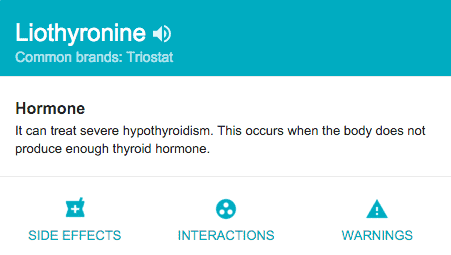
If these medications are all new to you then spend some time reading through the links above to get a better idea of how these various thyroid medications work and how they compare to the typical levothyroxine that most thyroid patients are prescribed.
If you are on a T4-only medication like Synthroid or levothyroxine and you are still symptomatic, then you are likely to benefit from adding T3 to your regimen in some form.
Many thyroid patients opt to take Natural Desiccated Thyroid (NDT) to get both T4 and T3 thyroid hormones, but some people do require higher amounts of T3-only medication and benefit from taking Cytomel alone or in combination with levothyroxine or Synthroid.
Remember that the type of thyroid medication and the dose you need is highly individualized. Don’t make the assumption that if a certain medication worked for someone you know that it will work for you.
The best way to find your type of medication and dose is through trial and error.
Step #3. Eat The Right Foods
I’ve talked extensively about finding the right diet if you have Hashimoto’s here but I will summarize some of the most important points in this article as well.
Diet is absolutely critical to weight loss, reducing the inflammation and autoimmunity associated with Hashimoto’s disease (7), and for your overall health.

Everyone knows this and I probably don’t have to spend any time convincing you that this is the case.
Despite this fact, thyroid patients still seem to experience a lot of confusion when it comes to their diet.
I get questions about diet on my blog, youtube videos, Facebook posts, and instagram posts all of the time.
To dispel some of this confusion, let’s talk about some general guidelines that you should be thinking about when it comes to your diet:
- Diet is highly individualized – what works for you may not work for everyone else.
- Most points (the vast majority) do better when avoiding gluten, dairy, and soy products – I’ve seen some patients who couldn’t lose weight suddenly start shedding points when they remove these food groups.
- Don’t count calories! – Instead focus on nutrient-dense, high-quality, real whole food.
- Avoid excessive sugary carbohydrates – Try to maintain around 20-30% of your total calories from carbohydrates (this varies based on certain hormone imbalances).
- Avoid calorie-restricted diets – or very low-calorie diets at all costs as these do not lead to long-term weight loss.
- Tailor your diet to your specific medical conditions– Many patients with Hashimoto’s suffer from blood sugar dysregulation, adrenal fatigue, and GI imbalances. Each of these problems should be taken into account when searching for your ideal diet.
- Avoid excessive goitrogens – But only if you are sensitive to them. Most people can tolerate healthy foods with minor amounts of goitrogens without any issues. Read this article for more information.

- Quick tip: If you don’t know where to start with your diet, I would start by eliminating wheat (including gluten), dairy, and soy. You may ultimately need a more restrictive diet but 60-80% of patients with Hashimoto’s will see huge improvements with change this alone.
Step #4. Exercise
I know, I know…
You’re not getting the whole “eat less and exercise more” spiel from me, but we can’t talk about weight loss without mentioning exercise.
The problem with Hashimoto’s patients is that they have to be VERY smart about how much to exercise and what types of exercises they do due to how the thyroid impacts energy levels and fatigue.
Figuring out how to navigate fatigue to allow for exercise can be tricky but it isn’t impossible.
Are any of these scenarios familiar?
- You’re told to exercise but you are so fatigued you can barely get out of bed.
- You want to exercise but after exercising you feel like you’ve hit the wall.
- You’re exercising 5 times per week but no matter what you do you can’t lose weight.
These are all too common in Hashimoto’s patients and they are all signs of a deeper problem.

Let me be clear:
You should be exercising, but if your thyroid medication isn’t optimized or you have Adrenal problems you may be doing more harm than good with excessive exercise.
If you fall into one of the scenarios above I would recommend further evaluation of your adrenal function. You would also benefit from checking your basal body temperature.
If the above tests show any issues, then address those problems FIRST before you start exercising again!
While you are fixing those problems make sure you stay active by simply walking for at least 30-60 minutes per day.
Low-intensity exercise like walking is a lot more effective than people realize and can pretty much always be done regardless of how much fatigue you are suffering from.
Start High-Intensity Interval Training
If you feel like your energy level is good enough to incorporate exercise then you may be asking what is the best type of exercise?
For weight loss, the answer is simple: high-intensity interval training or strength training.
These exercises have been shown to be very effective in burning fat and sensitizing your body to insulin (8).
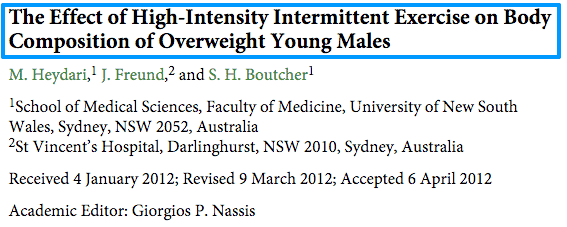
In many people, high-intensity interval training is more effective and requires less time than “cardio” exercises like jogging on a treadmill for 45 minutes every day.

What’s more…
You only have to exercise for 10-20 minutes 3-5x per week to get this benefit.
High-intensity interval training (sometimes referred to as burst training) is a form of exercise where you perform short bursts of all-out maximum effort exercises (9) for about 30 seconds with periods of rest in between.
HIIT can also be done with circuit weight training, on an elliptical, or while jogging/sprinting.
Strength training is also a very effective exercise method for weight loss because it promotes the growth of lean muscle mass, provides you with a constant calorie burn, and can help you age more gracefully.
When deciding which one is best for you, just go with whichever one you are more likely to stay consistent with long-term.
It doesn’t make sense to exercise like crazy for a few weeks only to burn out and not exercise again for another 6 months.
Find something that works for you so that you can consistently work out indefinitely.
This is how you will see the results you are looking for.
- Quick Tip: Ditch the treadmill and start doing HIIT. You will save time, burn more belly fat, sensitize your body to insulin and reverse leptin resistance. But don’t overdo it! Start with 1-2x per week and see how your body tolerates it before adding more days.
Step #5. Make Sure Your Gut Health Is In Order
It seems we can’t have a conversation without including gut health in the mix!
The reason is simple: the 100 trillion little bugs in your gut (known collectively as the microbiome) have a HUGE impact on your health.
These little bugs can increase metabolism, change how you digest food, alter inflammation, release chemicals that speak to your brain and even drive behavior (11)!
Most importantly, for our discussion, is that your gut health can impact your ability to lose weight.
Yes, it’s true:

It’s now clear that certain species of bacteria that live in your gut will either help you lose weight, or help you pack on the pounds.
Akkermansia (12) (part of the ancestral core microbiota) and bacteroidetes (13) seem to be associated with being lean and thin. Whereas higher amounts of Firmicutes are seen in higher amounts in people who have larger waistlines.
The moral of the story?
You need to make sure your gut health is up to par if you want to lose weight.
That means if you are suffering from bloating, alternating constipation, diarrhea, upper abdominal pain, acid reflux/GERD, IBS, IBD, SIBO, leaky gut, yeast overgrowth, or any other gut-related problems you HAVE to get your gut fixed if you want to lose weight!
Unfortunately, Hashimoto’s patients are incredibly susceptible to gut problems because thyroid hormone controls the movement of your bowels and it controls how much stomach acid you put out.
If either of these slows down or is not working properly then you are a perfect setup for gut dysfunction.
Step #6. Reduce Inflammation in Your Body
Many diseases, including the inability to lose weight (14), have roots in chronic low-grade inflammation.
The kind of inflammation that is caused by…
- Chronic Daily Stress (Work, Family, Social, etc.)
- Lack of Sleep (less than 7 hours per night)
- Poor Diet (Standard American Diet)
- Untreated Gut imbalances (SIBO, IBS, IBD, Reflux, Yeast overgrowth, etc.)
- Disturbances in the Gut Microbiome (Dysbiosis)
- Visceral Abdominal Fat (belly and organ fat)

If you want to lose weight you HAVE to address the causes of low-grade chronic inflammation.
Fixing the problem is usually pretty easy once you have figured out what your problem areas are.
In most cases, I recommend starting with the basics. By doing the following things you would be able to reduce the inflammation in your body significantly:
- Focus on relaxing and managing your stress. 20 minutes per day of yoga, meditation, or spiritual prayer should do the trick.
- Focus on getting at least 8 hours of sleep per night. You may need to supplement with relaxing herbs, botanicals, or even hormones like melatonin (though be very cautious when using melatonin).
- Eat nutrient-dense, real whole foods. If your food has a label or more than three ingredients don’t eat it! When in doubt leave it out.
- Fix your gut using some of my recommendations above.
- Take a probiotic and replace nutrient deficiencies (most common being Vitamin B12, fish oil, magnesium, and zinc.
- Exercise (1-2x sessions of HIIT per week) and stay active on days you don’t exercise by walking at least 10,000 steps.
- Quick Tip: Using the strategies above you should be able to completely eliminate inflammation from your body within 1 month. But please note that some people may require further blood testing to get to the root cause of their problem.
Step #7. Pay Attention To Your Cortisol & Adrenal Health
Cortisol is another huge player in weight gain and obesity.
Cortisol works in tandem with insulin and they both tell your body to take whatever calories you’ve consumed and turn them straight into belly fat.
The problem is this:
We as humans were never designed to battle the continuous and constant stress that we put on our bodies on a daily basis.
Our Adrenal glands were meant to provide us excess energy when we need it most, like bursting away from a lion or another form of danger.
Our bodies don’t know how to deal with the constant stress from working 12-hour days, dealing with social distractions, eating poor quality manufactured food, or the sedentary lifestyle of working from a desk 8 or more hours each day.
Our little adrenal glands can only keep up for so long. When they decide to poop out you get what is known as adrenal fatigue (though it’s also known by many other names).

There’s some debate as to whether or not adrenal fatigue actually exists.
I’m going to table that discussion for this article and just say that there is absolutely some condition or syndrome that impacts cortisol in patients with Hashimoto’s.
Whether you want to call that adrenal fatigue or not is up to you, but you can’t ignore the fact that the thyroid is connected to adrenal and cortisol health.
Adrenal Fatigue and Hashimoto’s
Unfortunately, people with Hashimoto’s have another reason to develop adrenal fatigue.
Thyroid hormone works in tandem with adrenal hormones (epinephrine and norepinephrine) to provide your body with energy in the form of ATP, and to maintain your basal metabolic rate.
When your thyroid hormone is low, your adrenals have to work overtime (15) to make up for the difference leading to debilitating and crushing fatigue.

How do you know if you have adrenal fatigue? You may experience any combination of the following symptoms:
- Crushing and debilitating fatigue even after 8 hours of sleep
- Salt and Sugar cravings
- Weight gain, especially in your abdomen
- Racing thoughts or feelings of anxiety, especially at night
- Increased energy in the evening
- Reliance upon caffeine or sugar for energy
- Problems maintaining blood sugar or the sensation of feeling dizzy at times
- Low blood pressure or unstable blood pressure when standing
- Brain fog or sluggish brain function
- Low sex drive
- You can read more about the symptoms of adrenal fatigue here…
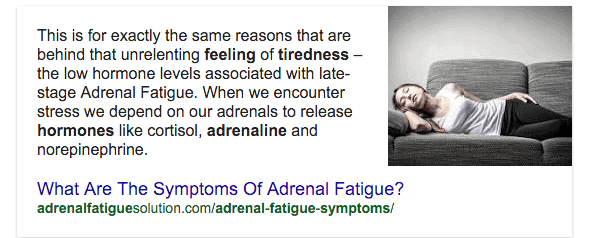
If you find yourself with the symptoms listed above or if you’ve been evaluated and treated for your Hashimoto’s/hypothyroidism but still aren’t 100% then you may be suffering from adrenal fatigue.
The treatment of adrenal fatigue deserves its own blog post but I can give you some quick recommendations to get started right away…
- Avoid Caffeine at all costs – it may be providing you with energy but at the cost of burning out your adrenals.
- Increase your consumption of salt (preferably Celtic sea salt or Himalayan pink salt). I even recommend putting 1 tsp in a large glass of water each morning.
- Consider taking adaptogens such as Rhodiola, ashwagandha, Siberian ginseng, or holy basil. I find that supplements containing ashwagandha or Rhodiola are often best for those with Hashimoto’s due to how they increase thyroid function and directly help with weight loss (but your mileage may vary). I’ve found the best success with this supplement over the years.
- Consider taking adrenal glandulars. Adrenal adaptogens directly help improve energy levels by providing adrenal hormone precursors, enzymes, and other nutrients.
- Take 2 grams of Vitamin C daily to help nourish adrenal function.
- Consume several meals throughout the day, you may need to eat every 2-3 hours to stabilize blood sugar levels.
- Consider evaluation for adrenal hormones such as DHEA, Pregnenolone, and or hydrocortisone (bioidentical hormone replacement therapy for late-stage adrenal fatigue/exhaustion).
- Quick Tip: Healing your adrenals may take months, and in my experience, it may take up to a month of treatment before you start to notice a difference so stick with it!
Step #8. Reverse Leptin Resistance and Insulin Resistance
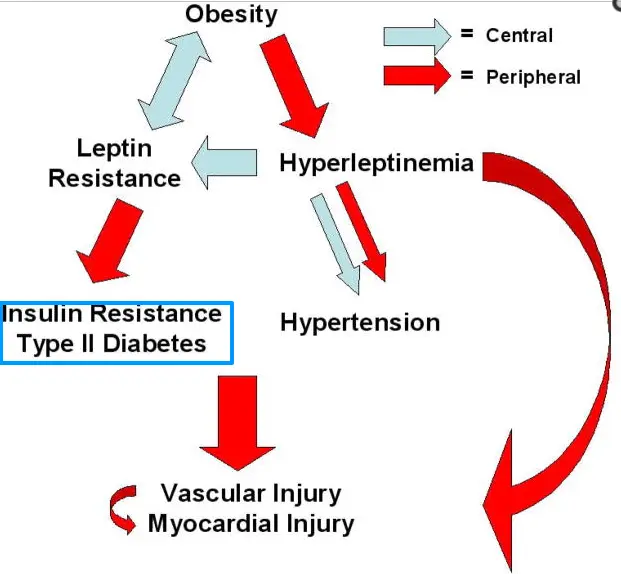
Do you find it impossible to lose weight despite doing “everything right”?
Leptin, more specifically leptin resistance, may be playing a major role.
What is leptin?
Leptin is a hormone that is pumped out by your fat cells (yes, they do more than just give you cellulite!).
The idea is that as you gain fat cells, the fat cells pump out this hormone that is then supposed to tell your brain that you aren’t hungry anymore and to increase your metabolism to burn the extra fat stores.
The problem?
We live in a time of “plenty” and most people have way too many fat cells and as a result, they have too much leptin.
This sequence reduces the influence that leptin has on your brain. Your brain thinks you’re in a state of starvation and severely lowers your basal metabolic rate (16), and whole body metabolism, and increases your appetite.
This process is known as leptin resistance and may be one of the most undiagnosed and underappreciated causes of obesity and weight loss resistance in our society.
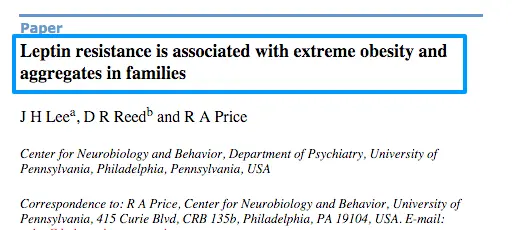
Leptin resistance also seems to have some genetic (17) component to it as well. This may explain why some families tend to always struggle with obesity.
How does Leptin Resistance Impact the thyroid?
As leptin levels (and leptin resistance) increase, your body starts to turn T4 into reverse T3 in an attempt to slow down metabolism (because it thinks you’re starving).
Recall from above that asrReverse T3 increases your body starts to directly block thyroid hormone and your metabolism and fat-burning ability will decrease accordingly.
How do you diagnose Leptin Resistance?
If you think that you may be suffering from leptin resistance I recommend asking for the following tests:
- Serum leptin levels: This should be < 10. Anything higher than 10 is a problem indicating that you have leptin resistance if you are also overweight. If your weight is normal and your leptin level is high then that is a normal response.
- Check serum uric acid levels: Anything > 5 is a problem and indicates your body has a problem metabolizing fructose.

How do you treat Leptin Resistance?
Leptin resistance is treated much the same way that Insulin resistance is treated.
Which would include: high-intensity interval training, intermittent fasting, targeted supplements, T3 thyroid hormone replacement, a diet focused on macronutrients, and certain medications such as Saxenda, Victoza, and naltrexone or Contrave.
- Quick Tip: Lifestyle changes may not be enough if your thyroid is under-treated, you have systemic inflammation or you still have insulin resistance. If you fall into this category you may benefit from medications that can sensitize your body to leptin. These include exenatide and pramlintide (they are both diabetic medications but help significantly with weight loss and leptin resistance).
Step #9. Avoid Endocrine Disruptors and Xenoestrogens
Did you know that detox is now mainstream?
Well, at least it should be…
Just recently the Endocrine Society (this is the society that sets the guidelines for how endocrinologists practice) came out with a paper “Executive Summary to EDC-2: The Endocrine Society’s Second Scientific Statement on Endocrine Disrupting Chemicals” which outlined how chemicals we come into contact with on a DAILY basis block your thyroid function at the cellular level.

What’s worse? These chemicals lower the ACTIVE thyroid hormone (18) in your blood but don’t affect the TSH!
This means that if your doctor is only testing your TSH they are behind the times…
It also means that if your Endocrinologist or Doctor isn’t teaching you how to avoid these chemicals they are doing you a disservice.
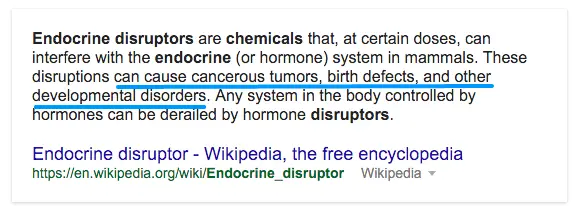
How do you avoid Endocrine Disrupting Chemicals?
So let’s talk about doing that right now…
Here are several tips you can start doing today to ACTIVELY avoid these chemicals that are likely interfering with your thyroid function:
- Stop touching receipts – Receipts have Bisphenol-A (19) (a known thyroid blocker) that is absorbed through the skin whenever you touch one. From here on out ask the cashier to put the receipt in the bag.
- Drink out of glass containers/cups – Avoid plastic containers, water bottles, and canned foods. These contain BPA and/or aluminum.
- Drink only filtered water – Get a reverse osmosis filter for your home if possible. But remember that ANY filter is better than no filter, so just get something.
- Avoid plastic whenever possible – This means plastic toys, food stored in plastic, food wrapped in plastic, etc. And never reheat (20) or microwave food stored in plastic (this causes more chemicals to leach out).
- Avoid bringing plastic toys into your house (opt for wood instead) – Soft rubber manufactured before 2009 is made with Phthalates (another known thyroid blocker). This would be things like rubber duckies, not hard legos made of plastic.
- Eat organic and grass-fed whenever possible and avoid dairy (unless it’s organic/fermented) – Or better yet just ditch the dairy because it’s probably causing inflammation in your body. But at least make sure to buy organic whenever you can.
- Avoid fragrances – If you see the word “fragrance” or “parfum” on the label, run the other way. This is code word for Phthalates.
- Check your cosmetics – Use the resource Skin Deep by the Environmental Working Group to grade your cosmetics based on how many hidden chemicals they have.
You can also find additional quick and easy tips to help you augment existing detoxification pathways that exist in your body to help support thyroid function here.
- Quick Tip: Use all of the above strategies and make sure to sweat profusely at least once a week to help Detox the chemicals that you’ve already been exposed to.
Weight Loss Is Possible Even With Hashimoto’s
My entire goal in writing this article is to give you a renewed sense of hope.
I know it can be hard to lose weight, I know it can feel frustrating, and I know it’s a long journey.
But the key is to just get started and to stay consistent.
This article should provide you with all of the information you need to do just that.
And, if you feel like you want to take a deeper dive into any of the topics I’ve mentioned here, I have videos and articles that go even deeper if that’s your thing.
I want to leave you with one parting thought:
No one cares more about your own health than you.
You can’t count on your doctor to do everything for you which means you will have to do a lot of the leg work on your own.
Accepting this reality is also an important step to take and one that some patients struggle with.
Now it’s your turn:
Are you someone with Hashimoto’s who has struggled to lose weight?
Is this the first time you’ve heard about some of the therapies or treatments listed here?
Have you previously tried any of the treatments listed in this article? Did they work for you?
What have you found to be the most helpful “trick” to weight loss with Hashimoto’s and Hypothyroidism?
Leave your questions or comments below!
Scientific References
#1. http://www.ncbi.nlm.nih.gov/pubmed/21104580
#2. http://www.ncbi.nlm.nih.gov/pubmed/7033265
#3. https://www.ncbi.nlm.nih.gov/pubmed/27345309
#4. http://www.ncbi.nlm.nih.gov/pubmed/19208852
#5. http://dmm.biologists.org/content/4/6/733
#6. http://www.ncbi.nlm.nih.gov/pmc/articles/PMC3963190/
#7. http://www.ncbi.nlm.nih.gov/pubmed/8985315
#8. http://www.medscape.com/viewarticle/853427?nlid=90103_2863&src=wnl_edit_dail&uac=25430DK&impID=872077&faf=1
#9. https://www.ncbi.nlm.nih.gov/pmc/articles/PMC2991639/
#10. https://www.ncbi.nlm.nih.gov/pubmed/12959622
#11. http://www.ncbi.nlm.nih.gov/pubmed/25974299
#12. http://www.ncbi.nlm.nih.gov/pubmed/26100928
#13. http://www.ncbi.nlm.nih.gov/pubmed/20955691
#14. https://www.ncbi.nlm.nih.gov/pubmed/19087366
#15. http://www.ncbi.nlm.nih.gov/pubmed/19753538
#16. https://www.ncbi.nlm.nih.gov/pubmed/17212793
#17. http://www.nature.com/ijo/journal/v25/n10/full/0801736a.html
#18. http://www.ncbi.nlm.nih.gov/pubmed/23337242
#19. https://www.ncbi.nlm.nih.gov/pmc/articles/PMC4685668/
#20. https://www.ncbi.nlm.nih.gov/pmc/articles/PMC3924457/
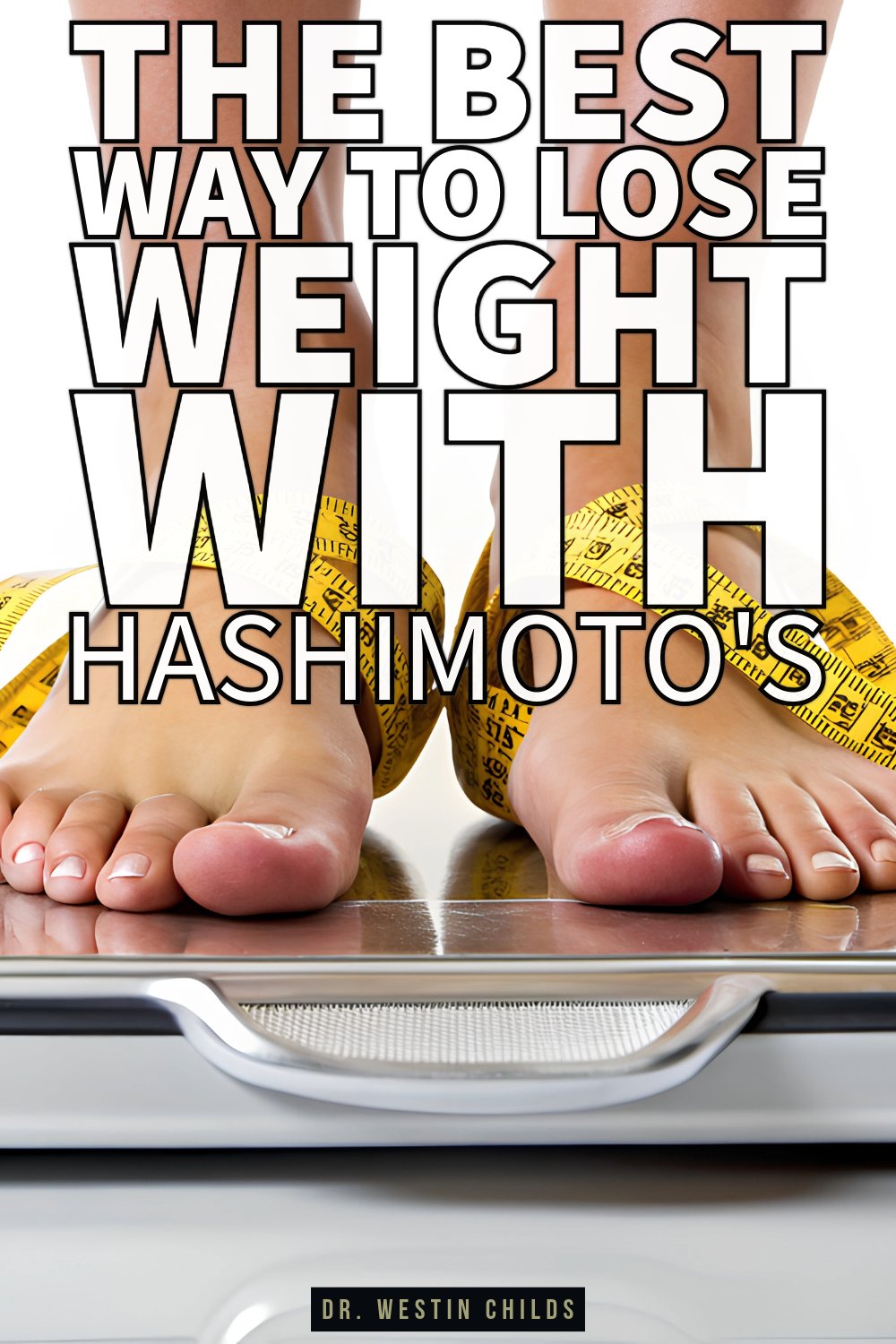
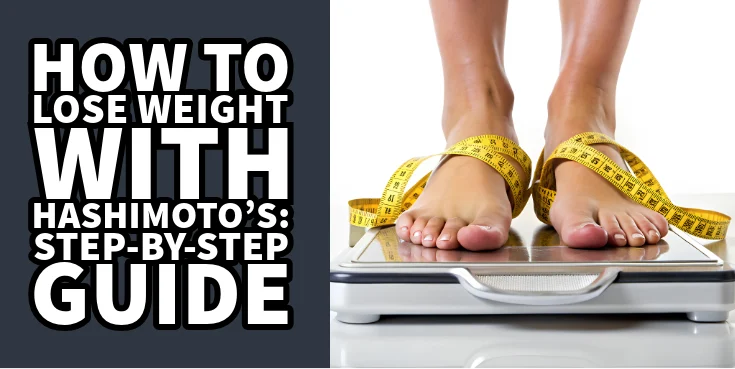
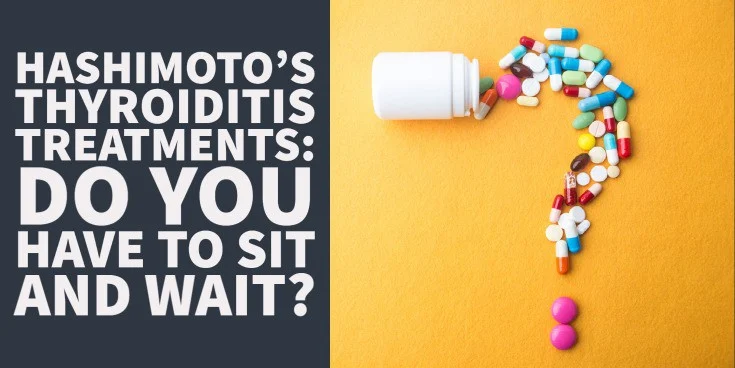

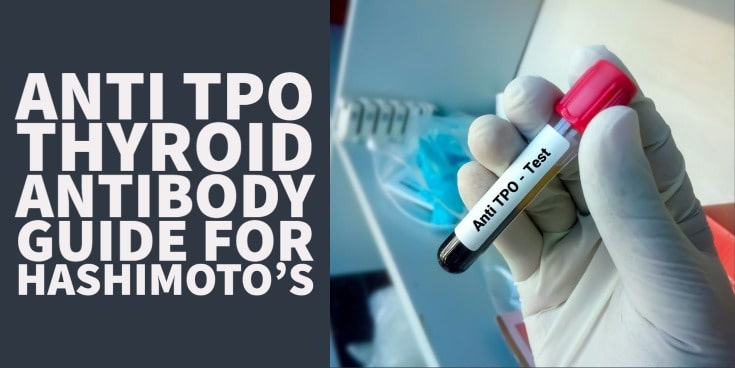
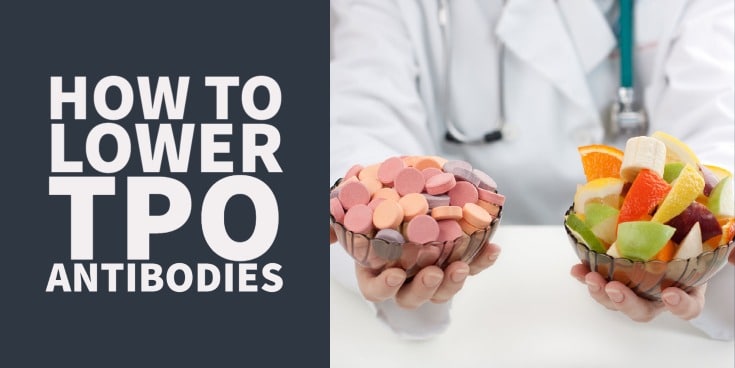
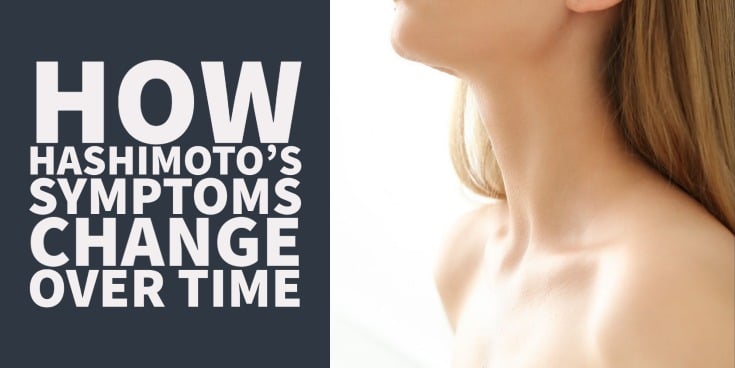
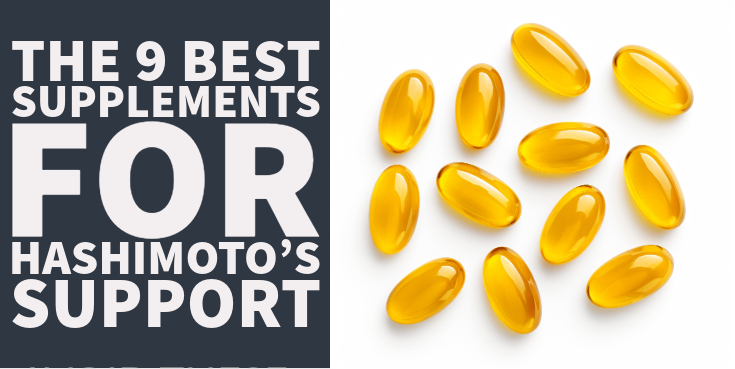

Great article, my endo reluctantly wrote a script for liothyronine,but refused to entertain the option for NDT,he claims it is too unpredictable.I will be asking him to order the cortisol and Leptin tests.
Thanks Heidi, I’m glad you enjoyed the article.
I’m sorry to hear that about your Endo. Most of them really don’t like prescribing NDT because they feel that the dosing is inconsistent (which isn’t actually the case). I would absolutely recommend checking leptin, insulin and cortisol levels! Just make sure you go to a Doctor that knows how to deal with the results.
my daughter is 12yr old and has TS. she’s got some hair loss. she has 1 patch about 5cms by 3cms and aohtner 1cm round patch. She’s been diagnosed with alopicia areata. She saw a dermatologist 3 weeks ago and has started on a steroid lotion to see if it helps.Hair loss is a bit more common in women with TS although still it does not happen too often and is very rare in children with TS. With my daughter they are thinking it’s her immune system attacking the hair follicles.My daughters thyroid function is fine, it always has been she takes no medication for that. She started estrogen treatment about 8 months ago, oxandralone aged 8yrs and growth hormone aged 4 years. The alopicia started about 2 yrs ago but the hair grew back after 6 months, then about 1 yr ago came back in the same place but got bigger and showed no signs of coming back.Luckily she has really thick hair so the patches are not seen, she can’t have her hair in 2 pony tails or french braids though as it can be seen then. but down or 1 pony tail and it’s not seen..She had a blood test done with her last yearly blood tests to see if there was any reason for the loss but all tests came back normal. I guess we will just have to wait and see if the hair comes back or not Was this answer helpful?
Great points. I would mention it’s worth looking into her inflammatory markers like ESR, and CRP. I would also look at ferritin levels as iron deficiency can lead to thin hair and hair loss.
If you haven’t already make sure you try her on an anti inflammatory diet, replace nutrient deficiencies and treat underlying hormonal imbalances.
Great comments!
I have hashimotos. I lost 40lbs by getting off gluten. I then realized dairy and soy made me sick too and removed them from my diet. I also tested my genetics and found I had two genes for celiacs. I also have mthfr 1098 and 677 and started on methylfolate and special B12.My antibodies are now low for hashimotos and My thyroid levels normal. I still had brain fog, IBS and fibromyalgia. I feel better since starting supplements. I feel good exercising and juicing too. I try to limit my sugar and pricessed food too. It is had because I love sweets.
Hey Lori, it sounds like you are on top of things! I commend you for that.
There was a prominent researcher on fibromyalgia (Dr. Lowe) who basically showed that fibro is really a disease of the thyroid and the result of tissue level hypothyroidism. He has many studies showing complete resolution in patients with the use of NDT and/or T3 therapy. If you are still having fibro symptoms (including brain fog) you may still have tissue level hypothyroidism. You can find more info here: http://www.thyroidscience.com/
His treatment regimen included:
1. Thyroid hormone
2. Trigger point injections
3. Nutritious diet
4. Exercise to tolerance
5. Replacement of nutritional deficiencies
I have found this regimen to be very successful in treating many conditions in general, but VERY helpful for Hashimoto’s and Fibromyalgia.
Hope this helps,
Dr. Childs
I have had to have joint steroid injections due to excessive pain. Each time I get them I lose weight. My doctor can’t explain why, can you?
Ive been gluten, dairy and egg free
for several weeks. The joint pain ceased immediately and I quickly lost 10 pounds but have since stopped losing weight despite daily exercise and a strict autoimmune paleo diet.
Hey Natalie,
Thanks for your insight!
That is typical for many patients I see. That usually means there is another underlying hormonal imbalance like insulin or leptin resistance. In your case it does sound like inflammation was definitely contributing at least a little bit to your weight and overall health.
Great job losing those 10 pounds!
This article is a gold mine (!).
This is the first time I’ve been able to find an answer as to why I get such a horrible reaction in my gut from probiotics – definitely will be trying your suggestions.
I’ve been on the path to healing for some time (‘severe adrenal insufficiency’, hypothyroid/Hashimotos), and I’m feeling so much better – but not quite there yet.
I think it’s time to talkto my Dr about some more/new tests to reassess what I need.
Thank you!
Hey Kim, I’m glad you enjoyed it!
I should also point out that getting on the right probiotics is still only the first step in treating gut related issues (especially if SIBO or dysbiosis is the underlying problem). Healing your gut can take months and involves dietary changes, supplements to kill the overgrowth of bacteria, pancreatic enzymes to help with digestion and absorption, supplements to nourish and heal the intestinal lumen and time. I hope this gets you started on the right track, though!
Hi Dr. Childs! I actually remember you from RVU, (I’m the Testing Director there) and I can’t tell you how happy I was to read this article and hear about the research you’ve been doing. Dr. Adrienne Kania pointed me to it.
I have been through the wringer with my health in the past few years, and saw several doctors and ran every test. After discovering I had a thyroid problem and being prescribed Synthroid, it was two more years before I got the Hashimoto’s diagnosis. Reading your article was like reading my diary in some ways, especially the section entitled “Dealing with the Extreme Fatigue of Hashimoto’s. I’ve lost 75 pounds altogether, and the first 40 or so were before Hashimoto’s and done mainly through intense exercise and calorie counting. After Hashimoto’s, and being told my thyroid levels were fine, I developed exercise intolerance and fatigue so extreme I thought I was going to be spending the rest of my life in bed, barely able to drag myself out of it only when I absolutely had to. I went through a pretty intense depression and had no quality of life, but since I wasn’t going to die, doctors shrugged and threw around diagnoses like fibromyalgia, adrenal fatigue, chronic fatigue, and metabolic syndrome, but no one could tell me what to do about it. Nothing anyone suggested helped.
I have a friend who has severe food allergies, and she suggested an elimination diet. I figured out what foods triggered the horrible headaches, fatigue, and mental fogginess that were my worst symptoms, and started eating as close to zero sugar as I could, and very low carb. I had given up on weight loss by then and was just desperate to feel better, and guess what? MIRACLE. It worked, I lost 35 pounds virtually without effort, (well, at least not intentional effort focused on weight loss!) and am now at a healthy weight for the first time in my adult life. I’ve rallied both mentally and physically and feel great.
If your research had been available to me two years ago, I would not have had to figure everything out for myself. So on behalf of all Hashimoto’s patients, thank you for the work you have done, which, it seems, no one else is doing. I intend to use the information you’ve provided to figure out the next steps to ideal health, which will include figuring out if my thyroid medication is right (I’ve only ever been on Synthroid) and developing an exercise routine that I can handle and that will make me strong again. (The only downside to weight loss that happened pretty much exclusively through my food plan is that I feel physically weak, when I always considered myself a very strong person naturally).
In short, rock on with you! I feel so proud, if that makes sense, that an RVU graduate did this important work, and I wish you all the best in your future.
Hey Patty! It’s good to hear from you!
I’m sorry to hear about your struggle but it sounds like you’ve been a huge advocate for yourself, which I admire. Your story is unfortunately all too common and something I see on almost a daily basis in my clinic – it’s the main reason I’ve been putting this information together!
In regards to your specific situation I would absolutely look into a different thyroid medication. I find (in my practice) that about 90% of patients feel *much better on some form of T3 therapy. Synthroid is a T4 only medication and in order to be utilized must be converted to T3 in the body. You can bypass this conversion process by providing the T3 directly.
Keep up the good work with your diet (and try to avoid caloric restriction because it can make thyroid function worse!). I have yet to find a Hashimoto’s patient that didn’t improve after eliminating gluten, dairy, soy and sugar 🙂
If you ever need anything don’t hesitate to contact me!
I am hypothyroid and have recently been told I have atrial fibrillation.
My doc has been doing many tests including cortisol.I have cortisol in my blood but when they do the urine test there is none.It was done locally then sent to a large city lab to test it and it still came back no cortisol.CAn you tell me why?
Elizabeth
Hey Elizabeth,
I would make sure the lab you used is reputable. Not all lab companies are created equal when it comes to testing both salivary and urinary cortisol levels. It is also possible that perhaps the testing strips you were using may have expired or something along those lines. Cortisol is required to maintain blood pressure in the body and low levels can cause serious problems to your health and put you at risk for death.
I hope this helps,
Dr. Childs
Please consider your magnesium levels as a piece of this puzzle.
Thank you, what a very interesting article. I have been taking levothyroxine for many years now. Blood tests always come back okay, but I know otherwise. I’ve been fighting the weight battle for years, and reading your article has shed a new light on things.
Have you written a book on the subject please.
Many thanks
Sandra
Hey Sandra,
You’re welcome, I’m glad you enjoyed it! I plan to write a book in the future about hormones, weight loss and the thyroid, but at this point I don’t have one. All of my information can be found on this website though.
Hi there I was diagnosed with hasimotos hypothyroidism 6 months ago, tsh level was 240…
B12 was low and so was my iron.
My doctor has provided me with
lyvothroxine 200mg
Folic acid 5mg one a day
Ferrous fumarate 305mg one a day
Cyanocobalamin 50mg one a day
I constantly feel sick, tiredness is slowly but surely getting better, but I am finding it extremely hard to loose weight. I put on nearly 2 stone on the few months before I was diagnosed although I wasn’t eating any different.
My mood varys from day to day I could either be up or down.
I also have poly cystic ovaries syndrome and haven’t had a period in 3months although I’ve been having spotting for 4 weeks now.
I’ve had nearly every symptom of under active thyroid
Looking for advice on getting this to settle down and to help me feel abit better.
Thanks in advance
Hey Lizzie,
A couple of thoughts:
Generally speaking patients that are hypothyroid (even if they are on medication) do better on liquid iron combined with vitamin C. In addition I almost always prefer to give b12 via injections and I would only give methylcobalamin because up to 40% of people have issues with methylation.
In terms of losing weight the first place to start is with thyroid medication. You must be on both the right type of medication and right dose of medication in order to fix and restore your metabolism.
Once that is in place you will just need to check the other hormone systems to find out which you need to balance.
With your history I have a high suspicion that you are in a state of estrogen dominance and would certainly benefit from balancing both progesterone and estrogen levels. Depending on your personal history, you may also have some degree of insulin and/or leptin resistance. In order to diagnose these problems you will need further testing.
This article is amazing. I have a doctor that won’t do further testing beyond TSH, and also keeps telling me to see a nutritionalist. I exercise daily and have cut sugar, gluten, and dairy and still remain 60 pounds overweight. I am now feeling depressed, hopeless, and just plain tired. I’m SO TIRED!! How am I supposed to fight for my health and do research on doctors when I can barely function enough to keep my home going?! I wish you were my doctor!
Hey Hannah,
Losing weight can definitely be complicated, but if you know what you are looking for it gets a lot easier! Keep up the good work with your diet and keep searching for a Doctor near by that can help you!
It can be tough but I would focus on hormones that you can balance yourself (like cortisol and your adrenal function).
i was diagnosed with hashimoto’s in 2000. i was prescribed levoxyl at that time and remained on levoxyl until a few years ago. (there was a recall on levoxyl and i started taking tirosint at that time) my thyroid panel was under control and i remained asymtomatic until 2.5 years ago.
for the past 2.5 years i have been battling with weight gain, fatigue, and brain fog. i went to a naturopathic doctor and had various tests. i was diagnosed with adrenal fatigue a year ago and was treated. i also had a heavy metals test. stool tests. i was given t3 for a short time although when my levels were drawn, results showed my t3 was very high and the doctor discontinued the med.
a year ago my medical insurance changed and i was encouraged to use generic synthroid. my doctor assured me it would be the same as taking brand name levoxyl or tirosint. my labs have consistently been within range, but symptoms persist.
i have been vegetarian for 25 years. i eat organic and non gmo. i have done gluten free and dairy free diets. i only use glass containers. i surf, run, walk, and do yoga. i am at a loss as to what i am missing in my treatment. my thyroid levels are within normal range. i’m currently taking generic synthroid 75mcg po daily, same time each morning with water only. any suggestions as to my next step????
thanks in advance.
Hey Lisa,
I never recommend basing treatment off of lab tests alone. You can find out why by reading this article: http://www.restartmed.com/thyroid-lab-tests/
And also why synthroid likely won’t be helping you either here: http://www.restartmed.com/levothyroxine-weight-gain/
Great article. I’ve been struggling with Hashimoto’s since September 2015 after I gained 10 pounds in a month. I’ve always been a clean eater and work out 6 times a week, so it didn’t make sense to me. Since then, I have been on many medications. I am now on Naturethroid, and my TSH levels have dropped to 2.24, and my thyroid antibodies have also dropped tremendously. However, I still cannot lose weight, and it’s very irritating. I also have a rash on the top of my back thigh and elbows that will not go away. I feel like I’m going crazy. I looked at my blood work, and my reverse T3/free T3 ratio is .11. Should I emphasize this to my doctor?
Hey Jessica,
You can bring it up to your doctor but you may get mixed results. Not many doctors understand how to interpret thyroid lab studies so often times it’s more frustrating than helpful.
I can’t lose a single pound although I exercise 4-5 days a week and keep a food journal. I am currently on Tirosint 88mg and see an endocrinologist. This article was very helpful and apparently I have a long way to go. Good bye gluten and dairy.
Hey SK,
That’s a great place to start!
I have unemployed for about a year now due to my (now -finally- diagnosed) Hashimoto’s issue and other Autoimmune problems. I say that just to let you know I have spent that entire time reading articles on this stuff and I HAVE to say this is the absolute BEST (most AMAZING) thyroid article I have EVER read in my entire life. This explains everything in such detail. You really spell everything out. I thank you so much for sharing your knowledge with us. Wow, just wow! 🙂
You are welcome!
Thank you for sharing this information. I was just diagnosed with Hashimotos and am learning all that I can about the disease and how to best help myself and improve my state of health.
Hey Megan,
You’re welcome! Thanks for the comment.
Hi Dr. Childs,
I had a quick question for you. Have you heard of the “Eat to Live” protocol by Dr. Furhman? The reason I ask is a few years ago I actually adopted that protocol. The only think I did not eat on the protocol were beans. So, basically I ate a pound of raw veggies (a huge salad), a pound of steamed veggies (which isn’t too hard to do) an ounce of nuts, an ounce of seeds, and about a cup or two of berries. I lost 35 pounds and felt fantastic save a very low, virtually non existent Ferritin level of 2. What do you think of this protocol? I know there’s very little in the way of protein but I’ve been told that women in general only require about 50 to 60 grams a day. My thought is I could add some pea protein to that original protocol but I worry about my iron levels which are ALWAYS so low even on medication. I really think you’re right about the sugar too. Also, I have another issue on top of Hashimoto’s and Hypothyroidism. I have a hiatel hernia so I have to eat very small meals throughout the day. This seems to help some. I’m thinking of eating half a pound of raw with half a pound of steamed in the afternoon and the other half in the evening. The berries, I generally have for breakfast with my black coffee and splenda (which I’m going to be giving up too). I don’t eat beans because they’re generally grown next to wheat so other than pea protein as a protein source, what else is there? I don’t eat dairy at all because it’s very hard on my digestive tract. I have IBS. Thank you for your answer ahead of time. 🙂
Hey Mary,
The best thing to do is experiment, so I think it would be a reasonable place to start.
You recommend before seeing a doctor to ask how they evaluate thyroid function. Normally when you set up an appointment, it’s handled by the front office, who may or may not know the answer. And some probably tell you what you want to hear, only to find out the first available appt is 6 months out, you finally get to meet the Dr and you find that they evaluate by TSH levels.
Can you offer some advice how to go a successfully prescreen the Dr before the first consultation?
Will they just give this information over the phone?
Hey Kathy,
For the most part it’s a waste of time to try and find a Doctor in the insurance model because 99.9% of the time the doctor will 1) be impossible to talk to and 2) always treat the same way. Most people who treat the way I do will be outside of the insurance model meaning you will need to pay cash for the visit, in these instances you can call the front desk and ask some questions.
I’ve found a few people here and there who get a primary care doctor in the insurance model to order tests/give medications but this is VERY rare.
Do you know any doctor in Southern California that is similar to what you do for thyroid conditions? I get no results when I put in functional medicine and my zip code.
Hey Susan,
Sorry I don’t know anyone who practices the way I do anywhere.
Hi Dr child’s I’m female 29 years old. Over the last 8 months I’ve had big issues with my stomach, and many other symptoms which i only recently found out it has been related to Hashimoto’s. My older sister and mother have recently been advised they have hashimotos as well. Many doctor has told me my thyroid levels are normal however I recently attended a Doctor who specialises in Hashimoto who said that I’m in the early stages. Anxiety started to develop when i am stressed and anxiety is not normal for me and i have ongoing stomach issies. I recently attended my local GP to discuss the anxiety as the other doctor told me to go my local gp to seek more assistance after she stated i have hashimotos and my local GP told me my thyroid is fine and normal.. im so confused as the other doctor told me i definitely have hashimotos and my issues are the clear systoms. Just wondering whether I do have Hashimoto’s and whether the symptoms are treatable. The GP that diagnose me with Hashimoto’s stated that I was in the early stages and she wasnt going to put me on thyroid meds that it could be treated with diet and lifestyle changes however the symptoms for instance the anxiety, comes in spurts when I am really stressed and it really is terrible. Today i had a bad panic attack after a stress occurrance. My coping ability with stress isnt very good now.
My TSH is 2.81 (ref range 0.50-4) and my thyroid antibodies are (anti thyroid peroxidase 110 and anti thyroglobulin is 185 (ref range <60). My iodine is 65 (RI 70 -530)
Im so new to all of this
Any advice or knowledge as to weather i do or no not have hashimotos or any info would be beyond amazing.
Thanks Kindly
Hey Elley,
I can’t give you specific medical advice but it sounds like you are suffering from the symptoms of hypothyroidism and Hashimoto’s. In many cases I think patients in this position have a lot to gain by starting thyroid hormone replacement.
Hello!
I have had my thyroid removed about a year ago. I didn’t gain weight right away but when I went on Synthroid I gained 10 lbs. I haven’t been able to lose weight since.
I maintain but would like to lose at least 10 and more like 20 lbs. I have been diagnosed with fybromyalgia and chronic fatigue syndrome. I was put on low dose estrogen patch as I was estrogen deficient. I have had a partial hysterectomy. I am 53. I don’t do gluten and mostly drink almond milk and watch the dairy. Meaning only in small doses. I also don’t eat a lot of processed food. I watch sugar intake as it makes me tired. Not sure what to do? Could you recommend any functional medicine Dr. like yourself I live in the Twin Cities of Minnesota.I also have had a hard time regulating my synthroid.
Dr Wand of bloomington, MN
Hello!
I have had my thyroid removed about a year ago. I didn’t gain weight right away but when I went on Synthroid I gained 10 lbs. I haven’t been able to lose weight since.
I maintain but would like to lose at least 10 and more like 20 lbs. I have been diagnosed with fybromyalgia and chronic fatigue syndrome. I was put on low dose estrogen patch as I was estrogen deficient. I have had a partial hysterectomy. I am 53. I don’t do gluten and mostly drink almond milk and watch the dairy. Meaning only in small doses. I also don’t eat a lot of processed food. I watch sugar intake as it makes me tired. Not sure what to do? Could you recommend any functional medicine Dr. like yourself I live in the Twin Cities of Minnesota.
I need some advice. I’m seventy-one years old. I was diagnosed with Hashimoto’s nearly twenty years ago. I was started on the lowest dose of levothyroxine and I did very well. I had some other health problems many of which actually began improving, and in 1999 a spinal fracture. Following surgical repair, I started physical therapy and rehabilitation. I began losing the weight I had gained while rehabbing, and eventually was able to walk, first with then without a cane.
I looked healthy again, had energy, slept like a baby, and felt better than I had in years.
Following an abnormal blood test last year (2015) my Primary care MD discontinued the thyroid hormone replacement. I was supposedly getting 400 times more thyroid hormone than needed(!?) I asked to have the test redone but she said it wasn’t necessary. Within a month I had gained ten pounds, all the symptoms of hypothyroidism came back over the next few months. I started having trouble thinking clearly, maintaining a train of thought, and getting lost. When I got on the scale every morning it was always a shock.
Last month I had another set of lab tests, my tsh went from 1.1 to 3.4. Still within the range of “normal” but what if that range isn’t normal for me? I feel awful, look awful can’t think straight, am losing a fistful of hair every day, and I weigh over two hundred pounds, all in one year. Trying to find a new doctor is complicated because many of them won’t take anyone on Medicare. I honestly don’t know what to do. Can you give me any suggestions?
Hey Rose,
It sounds like you need to focus on finding a Doctor willing to help you with your Thyroid. Most likely anyone that takes medicare likely won’t be able to help you anyway so I would start looking outside of the insurance model.
Hi, I enjoyed your article. I live in the UK and unfortunately, the doctors here don’t generally treat when thyroid antibodies are found. They only treat for hypothyroidism when the TSH drops! I have lupus, sjogren’s and fibromyalgia, with thyroid antibodies – and yet because my TSH is normal, I get no medication! I have all the symptoms of Hashi’s – feeling cold, battle with weight, dry hair etc….but get no help. Is it possible to address hashi’s without medication and by lifestyle adjustment only? Please advise….thanks!
Hey Terri,
It depends on how much damage to the thyroid gland has occurred, in some cases yes and in others no.
Hi Doc, I have been a low thyroid and Hash person for maybe 15 or more years. Most of my low thyroid symptoms have been maybe 15 or so lbs. overweight, although I’m very active and muscular. Also ongoing mild depression has plagued me most of my life. I am not low energy and have never suffered from body coldness, quite the opposite! I am 58, take bio-identical Biest< and compounded Testosterone. I find that low hormone levers are just has harmful as low thyroid. I take T3 and T4. I was one of those who did not respond well to T4 treatment only. T3 made me feel like the lights were turned on. I eat a paleo diet, only goat or sheep dairy raw and I ferment my on yogurt and kefir, I eat no soy, almost all organic and lots of veg , although I was overdoing the serving size of protein and have since reduced. my biggest problem is insulin resistance. my fasting blood sugars are wonky and if I don't eat in the morning it keeps going up. found that taking a few caps of fish oil in the am slows the progression. I have to get control of this. I am an herbalist and have tried every herb in the book for BS control. The herb Gymenma works the best so far. I have always felt that the same autoimmune issue with my Thyroid (also have TBG deficiency)is responsible for my insulin resistance. I was once on steroids for swollen hands and it made my fasting BS go down! I think I would respond well to LDN? When I eat a early dinner like at 530 with veg and small protein, sometimes one glass of dry wine, take Gymenma, my before bed sugars is like 112 and it used to be the same when I woke up. but now its closer to 130. I started taking Thyroid meds at night but I think T3 is keeping me up. I was reading that T3 can cause insulin resistance and elevated blood sugars? is that whats happening, HELP I'm so confused
Sir i m suffering the same problem aa u disscussed above i m dóng yoga for 45 mom going gym for 90 min and walking for 4 km in evening and following diet but still not lossing weight my tsh is 1.26 and um taking 75levothyrixin pls help
Hey Payal,
I would start with the recommendations in this blog post and then look throughout the rest of my site for further and more advanced help.
I really enjoyed this article! I have been struggling with hashi’s for over three years, and after gaining 40 lbs I feel defeated. I have been seeing an Osteopathic doctor for the past two years and we’ve tried various things (armour thyroid various dosages, adrenal supplements, iron, iodine, etc.) but still the weight gain and other hypothyroid conditions persist. I am tired and depressed with the ongoing struggle( not to mention constantly cold), and wondering what to do next. Any suggestions?
Hey Lulu,
I would also consider evaluating other hormones including insulin, leptin and testosterone levels.
Hi Dr Childs,
What do you mean by Uric Acid levels being a problem if greater than 5? What measure is that? When I was tested in November they were 202 umol/L and the range was 143 – 339.
Thanks
Aysha
Hey Aysha,
The units of your test are likely different from mine so you would have to change the units to get a clear understanding and to use my reference ranges provided.
Good evening Dr. Childs,
Thank you so much Doctor for all the clarifications about Hashimoto’s.
I am taking Nature-throid, Selenium, and Mg. My biggest struggle is Anxiety(Panic Attacks which I think is more expected when we are hyper not hypo) and also high testosterone which I never had before.
My Doc is watching all my numbers.
Do you think Doctor that any person who has Hashimoto’s should go Gluten Free?
Thank you so much!
Best
Hey Maggie,
Going gluten free is a step worth considering (and even an honest trial) if you have Hashimoto’s, but there is no hard and fast rule.
I was diagnosed with Hashimotos disease at 13 years old and was off and on Synthroid because I was irresponsible with taking it. When I joined the service at 18 years old I found a supplement called “Oxy-elite Pro” which has since been taken off the market and made me lose 35lbs with diet and exersize. Of course I am now 27 and have just had a baby, ( I took synthroid during my pregnancy), Im still taking it and I have been eating as healthy as possible and exercising daily with absolutely NO weight loss. I gained 60 lbs during my pregnancy despite the fact I was still jogging at 6 months pregnant. Im hoping for some results after making the changes you discussed.
Great! Keep us updated on your progress.
This was an enormously helpful article. Could you recommend a doctor in New York City who shares your understanding of Hashotos?
Many thanks
Hey Hope,
I’m glad you found it helpful. Unfortunately I don’t know anyone in that area to refer you to.
Hi
I am struggling with this diagnosis right now. I was diagnosed about 1 1/2 years ago. I have been on armour and my numbers look ok, except no one has ever checked my reverse T3. My inflammatory markers have all come down nicely but my antibodies at still 800. I have been very fit and heathy until this. Now I can barely work out without getting out of breath and fatigued and I am gaining a ton of weight in my hips and thighs . I dont know what to do. I have been eating very clean since I found out, though my diet was never bad. Now I am grain free, dairy free, refined sugar free, alcohol free… one cup of chai tea in the morning… and organic grass fed and low mercury seafood. I do not consume a lot of calories I do not know where this weight is coming from! HELP 🙁
Hey Jennifer,
Make sure you evaluate your estrogen/progesterone levels, I would also recommend looking into your fasting leptin and insulin levels. The first step is to figure out what is wrong because you can’t treat by guesswork alone.
Wow, lot’s of information . I have been dealing with this for several years,as I’m sure you hear alot. I have been through the crying stage now I’m in fight mood. This has taken my life from me an has damaged my marriage thank you for what you have put out there.
Great post/podcast and very informative!
I have been diagnosed with hypothyroidism (and most likely thyroid resistance based on what I am learning from your site) and was prescribed Liothyronine 5MCG taken 2x daily. As I began this medication and took it for a few months — I stopped my period after the first month and then did not have a period for 3 more months. I gained 10 pounds.
Ive also tested positive for Shogrins.
I take a low dose progesterone and testosterone.
I have done HCG about 10 years ago in 3 cycles over a year period.
I had a baby the following year and gained 60lbs and have not been able to lose the weight. I have bounced around 10-15lbs through diets, but overall I can tell my body is not functioning properly.
Im wondering if taking this T3 was sufficient for my needs? or what is related to the stopping of my menstrual cycle? or is that a real concern compared to my other issues??
Thanks!
Do you have a book? Or just the weight loss program?
Hi Lindsey,
Just a weight loss program for the indefinite future.
I need help is there any one I can see in California
Hi Amy,
I don’t know anyone to refer you to in that area, unfortunately.
Dr. Childs:
1. Thank you thank you thank you for info re: Leptin & Thyroid resistance. After viewing your video and checking my labs over the past year, I am a model of what you discuss. Right down to last labs are TSH suppressed to 0.02 from 3.96 in 6 months! Dr. now saying I’m hyper, just as you presented. I’ve lost and gained the same 90 lbs. 6x over past 15 years. 🙁 I did Ideal Protein 2x but gained it all back; now I know too much about soy and artificial sweeteners to use it again…but your info points as strongly to the calorie restriction. Suffice to say, I’m in an ugly place again.
2. Florida dr. refuses to listen; she only says eat less exercise more. =O No matter what I do, my weight keeps climbing. I have been eating 810 calories/day for 2 months; weight will go down .6 one day and jump back up 1# the next. I want to try T3 only med for a couple months and drop Naturethroid (97.5mg). What is your opinion of Biotics GTA-Forte II with porcine glandular concentrate at 20mg per capsule? Would this be a viable source of T3 only to try for reducing free T3 and leptin resist?
3. As I noted above, I fit your description of leption resist perfectly … except … I am never hungry. I eat because I’m supposed to eat, and get a hypoglycemic reaction occasionally if I forget to eat, but I’m never what could be described as hungry. I have tons of cravings and would love to eat carbs and sugars, but I don’t. I’m past them because I realize they are the reason I’m here again. What are your thoughts on that particular issue, I’m never hungry and able to resist carbs/sugars?
Stats: 52 yrs old, 188 lbs, 5’2″.
Last labs 6 months ago show these from 6 months prior:
A1C climbing to 5.8 from 5.6
Thyroglob anti same at 2, Thyroid Peroxidase anti to 167 from 146
T3 reverse to 15 from 9
T3 free to 3.8 from 2.5
T3 total 145
T4 free to 1.0 from 0.8
T4 total 7.0
TSH to 0.02 from 2.96
Cholesterol total to 183 from 206
HDL to 55 from 58, Tri to 80 from 83, LDL to 112 from 131, ratio to 3.3 from 3.6, non HDL to 128 from 148.
Glucose to 105 from 92
Ferritin to 23 from 14
Thanks for any thoughts, and here’s hoping a spot will open after you cure a current patient so I can work with you directly. ~Dolores
I think I have Body Set Point Malfunction. Any tips on eliminating that? I have been 150# since high school (20 yr ago). I have lost weight several times (20#) but always go back to 150# as soon as I reintroduce moderate amounts of sugar/alcohol/bread.
BACKGROUND: I had SIBO and Candida overgrowth for a few years and after that finally got resolved (about a year ago), I had fatigue, swelling, low BP and continual weight gain for the next 6 months. My naturopath checked my hormones and found low cortisol. I took adaptogens for a few months to raise cortisol to almost normal level but then got insomnia. We found that my progesterone got really low so I stopped adaptogens and started taking progesterone. Insomnia is gone but weight loss resistance is still present (even with 1200 kcal/day paleo “diet”, and HIIT several times per week) and my thyroid hormones are even lower than before so I started NatureThroid this week.
LABS:
Reverse T3 is 13.2,
Free T3/Rev T3 ratio is 0.21,
Free T3 is 2.4,
TSH is 2.34,
Free T4 is 1.2.
I’m not sure that I need to check Leptin levels since T4 is pretty low. I’m not considered overweight so I don’t think I need to check Insulin levels. But I did gain 22# this past year and would like to lose that. Hopefully NatureThroid will be the answer. Naturopath said she sees hypothyroid happen a lot after SIBO and it goes away within 12-18 mo of low-dose thyroid hormones, which are not high enough to completely suppress endogenous thyroid hormone production.
I found out I have Hashimoto’s in June and have started on levothyroxine and am feeling better as far as fatigue goes but have not lost any weight. I started the low fodmap diet before I found out I had Hashimoto’s because I had a lot of bloating/gas and felt like my stomach was distended. After my diagnosis, I started the aip paleo diet. How bad is it if you cheat once a week and have foods that aren’t on the diet?
Hi Jana,
You can learn more about the AIP diet here: https://www.restartmed.com/aip-diet/
Hi Dr Childs – this was really interesting. I’ve been on a diet similar to what you outlined above for about 6 weeks now. I was suffering from extreme fatigue, weight gain (15 pounds in a year, very active – play tennis, run, lift, etc. – 5-6 days /wk), loss of sex drive, difficulty concentrating, etc. The diet seemed to have solved the fatigue as my energy is back but I have not lost any weight. How long does it usually take to see weight loss results?
Thanks!
Chelsea
Hi Chelsea,
If you are on the right diet for your body you should notice a change in weight within a matter of 1-2 weeks.
Hi Dr Childs!
Great article! I was diagnosed with hashimotos about 6 years ago and thankfully through NDT and good nutrition – no gluten , dairy , or soy – good probiotics and vitamins- my antibodies are almost to zero. I feel pretty good but NO MATTER WHAT I DO I can not seem to lose the 50 plus lbs of extra weight I have. I’ve tried literally every diet you can think of and am also active. My body just refuses to drop the weight and it’s been years of this struggle going on. I wish I knew where to focus to get answers. Any recommendations?
Hi Anne,
You can find more information about weight loss in my guide here: https://www.restartmed.com/hormone-mastery/
If I am able to do your program how would I get prescriptions for the possible medications you recommend?
Hi Anne,
To get medications you will need to have a physician prescribe them to you.
Very helpful article/video, but I’m feeling a bit overwhelmed by it like I need a physician to help manage this all with me. As my current endocrinologist is less than helpful, how do you suggest that I go about finding someone locally? Thanks!
Hi Amanda,
You can use this resource to help you find a thyroid doctor: https://www.restartmed.com/thyroid-doctor/
Thank you for your depth of knowledge and insight into this very complex issue. I had hypothyroidism since my twins were born over 22 years ago. In 2014 the disease upgraded to Hashimoto’s Thyroiditis….wondering if I followed all of the aforementioned, would I ever be able to get off the Armor / Thyroid medication. Can one with Hashimoto’s disease survive alone on the vitamins, supplements, diet and exercise without being on the actual prescription? If so, how would that work? If not, why? Thank you!
Hi Susan,
It depends on whether or not your thyroid is able to function on its own and how much damage has occurred in your life from Hashimoto’s.
Hi! it looks like it’s been a while since someone has posted a question…but need to ask. I have a body set point malfunction. I need to lose 20 pounds…I have had Hashimoto’s since 2004…I am taking nature thyroid, but cannot lose weight still. I walk 2-3 times week and do lightweight strength training 2 times a week. How do I change things to change to body weight set point?
Hi Susan,
You can look into therapies like LDN: https://www.restartmed.com/naltrexone-weight-loss/
Hi Dr. Childs,
Thank you so much for these ideas.
I am in my early 20s and was diagnosed with Hashimoto’s at 18. In the past 2.5 years I have gained nearly 100 pounds, not at a constant rate but in bursts of 30-40 pounds in the span of a few weeks.
I have been on Synthroid for a while and was also on metformin for insulin resistance, but have since gotten off metformin since it wasn’t benefiting me. My T3 and T4 are at normal levels and have been stable for a year, but I am still symptomatic and not losing weight. Do you know if Hashimoto’s patients can find success with a program like Weight Watchers? Is it possible that there’s more going on with me than Hashimoto’s?
Thank you again.
Hi L.G.
Weight watchers will typically cause metabolic damage and lead to weight gain long-term. Any diet that is based on calorie restriction will cause this type of problem.
I have struggled with my weight for 20 years! I am currently on levythyroxine 125mg and cytomel 5mg (2). I take them at night. It is very frustrating when you cannot lose weight and you try soo hard!!! I am not a big eater and not sure if that’s the problem. I take an iodine supplement and low dose Actos because of PCOS. Please let me know if there is anything else I need to do to get this weight off me!
Hi Meghan,
I would start with the tips in this article but you can also find more information here: https://www.restartmed.com/lose-weight-hypothyroidism/
I was diagnosed with Hashimoto’s when I was 40. I’m now 63. At first, things seemed to be ok, until I faced a life-altering season of stress 5 years ago. Then everything went down the tubes. I gained 40 lbs in 3 months, lost a ton of hair, my skin seemed to age 10 years overnight, and I became dangerously depressed. I was on Armour thyroid at the time. I went to a new Dr that said my B-12, and vitamin D levels were very low and immediately started treatment to remedy that. I was taken off of Armour and put on Tirosint (or something like that) in the family of Synthroid. Immediately started losing more hair. I did begin to feel better more energy, uplifted mood, but weight gain and hair loss continued, very dry old skin, and brittle nails also. My general doctor started me on BioTe which helped with the menopause issue that seemed to run over me during this time as well. He changed me back to 90mg of Armour. My last blood workup shows everything to be in the normal range except for TSH which was 0.230. My Dr was content with that. I’m not content! I can’t lose weight, my hair continues to fall out… contemplating a wig. I don’t know what else to do. The doctors in my area just not seem to care enough to help me. Suggestions?
Hi Donna,
It sounds like you may be time to seek out a second opinion from another physician. You always want your current set of Doctors to take your issues and complaints seriously so they can work them up. You can find more information on how to find the right type of doctor here: https://www.restartmed.com/thyroid-doctor/
Hi Dr Child’s.
Really enjoyed All the information in your talk.
I have hasimotos thyroiditis 5year diagnosed, tried natural remedies to my ignorance of this , which only made me worse. Eventually went to an endocrinologist, I’m on 125mg eltroxin daily. Joined a club to loose weight have nearly 2 stone off since early March 18 but it is soul destroying weighing in weekly to see my best efforts have seen just a half a pound loss,or an odd week 2lbs. I still have a stone and a half to go, any advice would be greatly appreciated.
Hi Kay,
I would start with the treatments here! You can also check out this post for more info: https://www.restartmed.com/lose-weight-hypothyroidism/
Hi Dr Childs,
Have been reading your recommendations for Hashimotos. I was actually diagnosed with Graves disease and was recommended Ratioactive Iodine Treatment, which I followed up. Which makes me now underactive (hashimoto). I am experiencing a lot of issues. I have changed my diet, I love coffee and haven’t cut this out, but will do from now on.
I want to get some of the tests done that you recommend, as I have put on too much weight on and need to find out what my body is doing in regards to deficiencies and intolarances. By following your recommendation even if I originally had graves disease, am I on the right track in this respect.
Hope you can assist.
Hi Julia,
Undergoing RAI does mean that you are hypothyroid but it doesn’t necessarily mean that you have Hashimoto’s. These two conditions are similar but different. If you aren’t sure if you have Hashimoto’s I would recommend that you read this article for more information: https://www.restartmed.com/hypothyroid-vs-hashimotos/
I got diagnosed with Graves disease in January and leading up to the diagnosis I gained around 40 pounds in 3 months. I actually have a hyperthyroid with all classic symptoms for hyperthyroid except I have been extremely exhausted and can’t lose weight. My lab levels are back to normal and most of my symptoms have cleared but my weight is the same. I am currently working out 4 to 5 times a week for 2 hours each time doing a combo of weight training and HIIT. I have also tried to eat very clean and track all of my meals. I started out trying to eat 2000 calories a day and have slowly reduced to around 1600 a day. I am 18 and have always been active and around 120 pounds so this weight gain is extremely frustrating. Just last year before this all started I was able to do less exercise and maintain my weight at 2500 calories a day and now I can’t even lose weight on 1000 calories less every day with more exercise. I’m not sure what to do differently and doctors just assume it must be me being irresponsible with my diet. I know that I am accurately tracking everything because I have (not that it is healthy) counted calories since I was 14. Being encouraged to restrict more is very unnerving. I am extremely active and really do eat clean. I also take apple cider vinegar which I am not sure if this helps or harms the situation. What should I change, because no one believes I could have gained this much weight with hyperthyroidism and also think it is my fault it is not coming off?
Another great article!! Dr Childs, All of my meds are good but still struggling to lose the last 10 lbs. I can only afford one of your supplements, which would help me the most to lose weight?
Thank you!